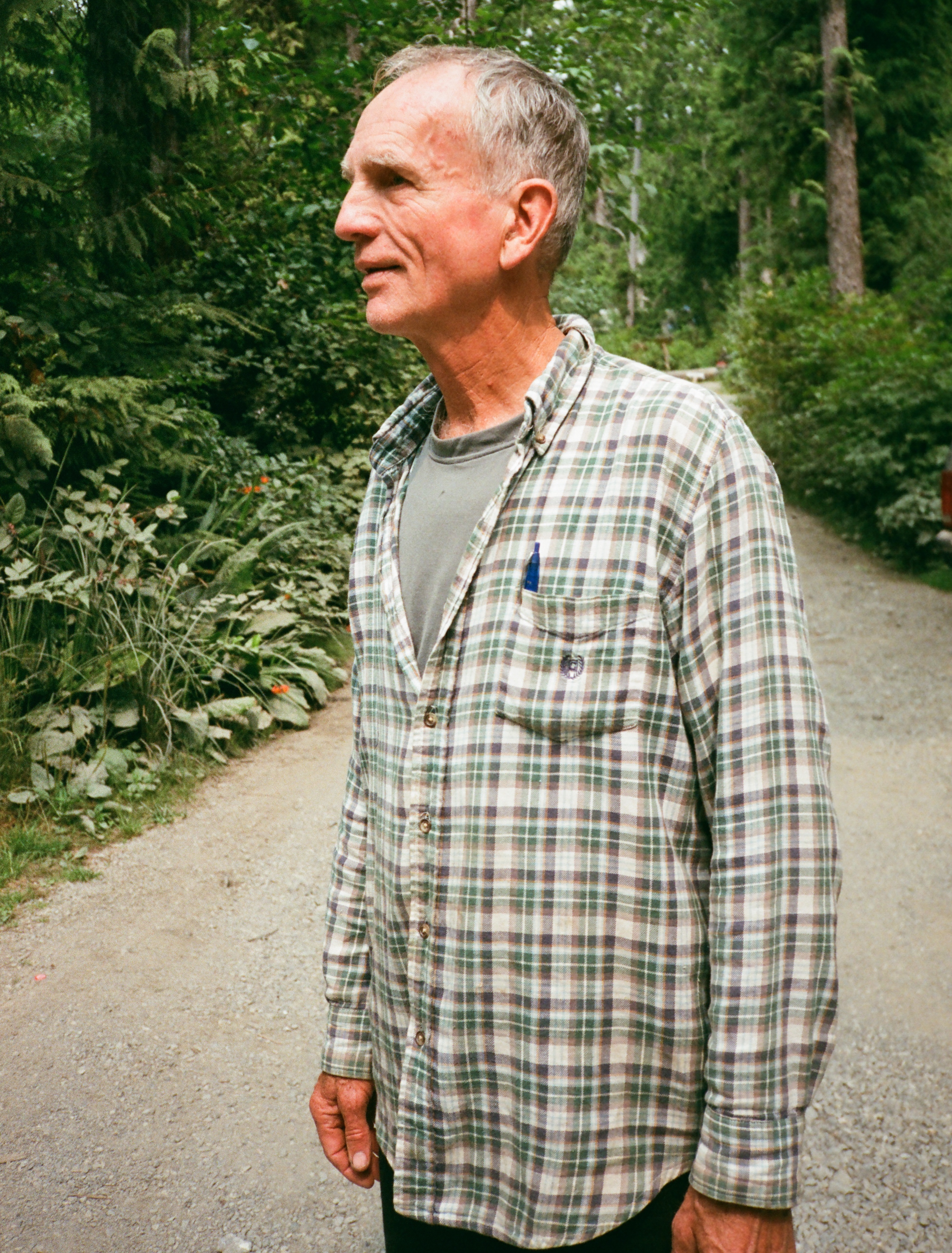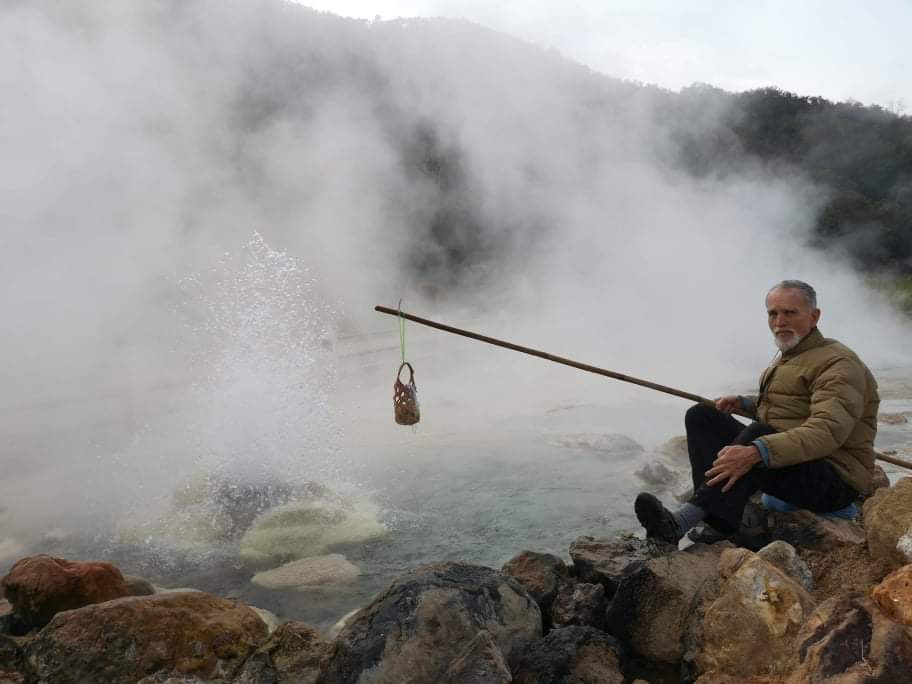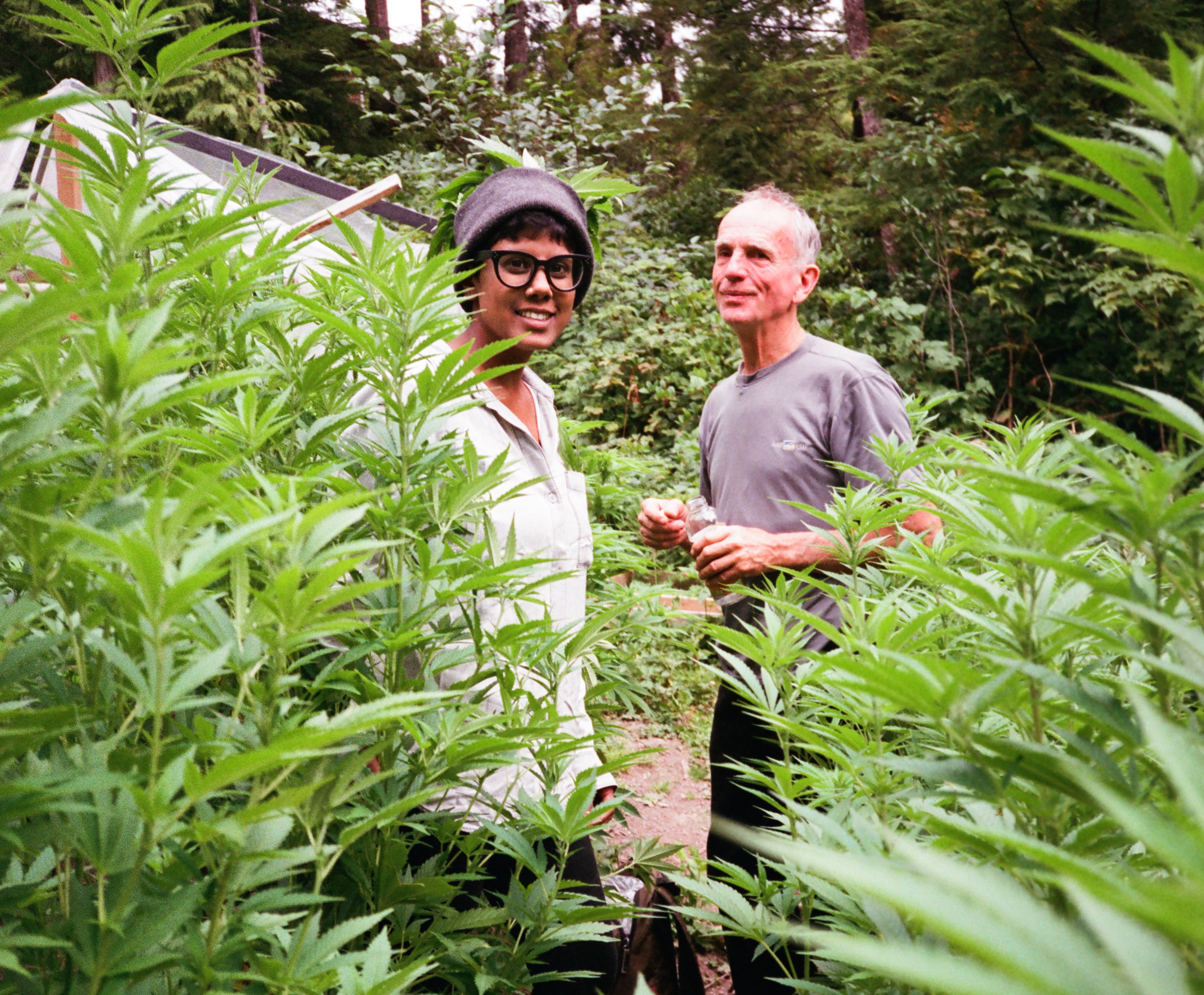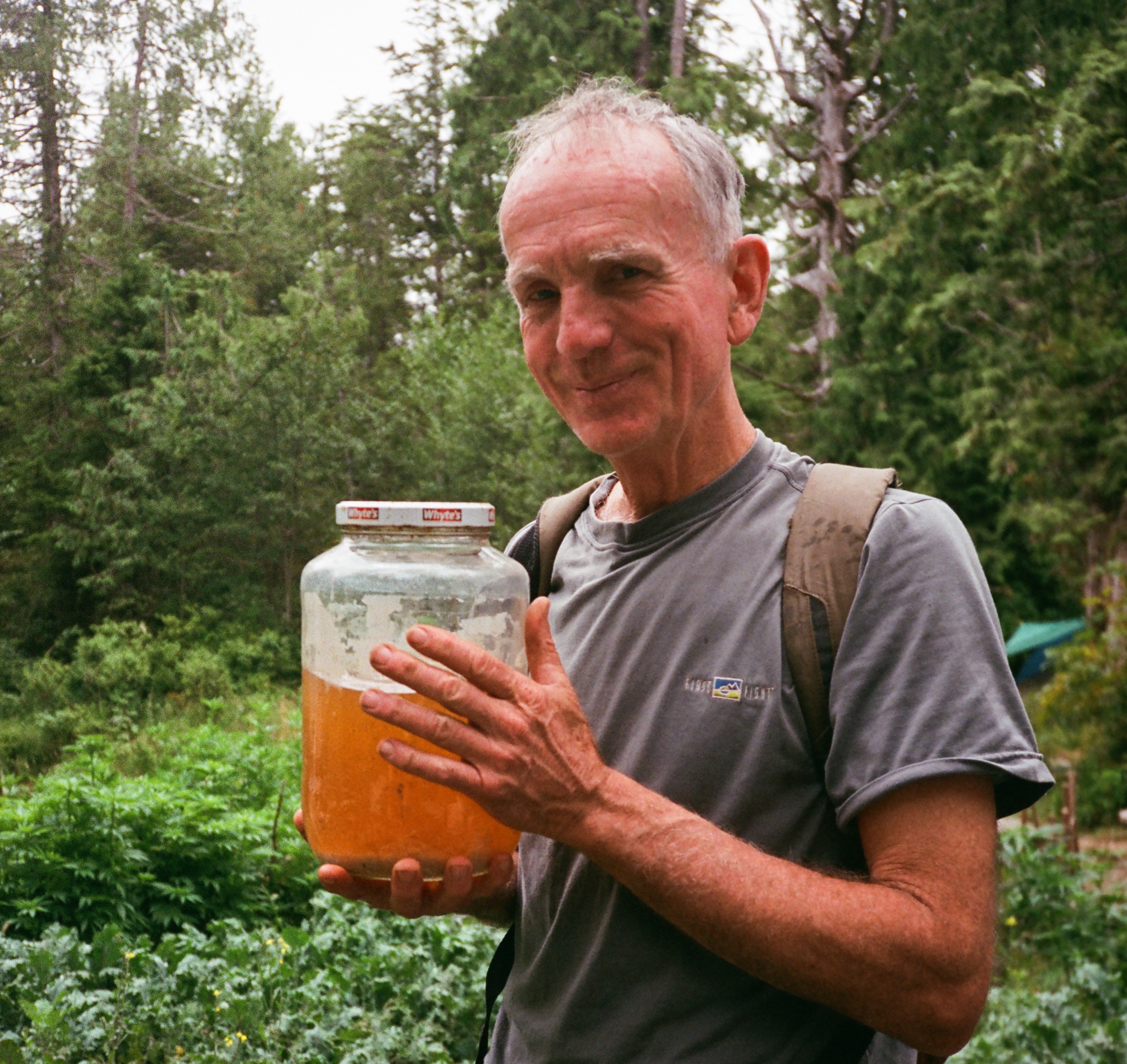When I told Lilly Woodbury, Michael Poole’s daughter, that I’d love to interview her about her father’s life and get some of his biographical details straight, she laughed and said that might be a challenge.
“He didn’t really speak in a linear way,” she said, noting that he wasn’t a conventional person, so I might not be able to write a conventional obituary. That much would be clear to anyone who had even a passing conversation with Poole.
Videos by VICE
Michael James Poole, an eccentric, larger-than-life figure who spent the past three decades running Poole’s Land, a psychedelic commune in a Tofino rainforest, died peacefully in the oceanside town on June 16. He was 68.
I first went to Poole’s Land in 2017, having heard the B.C. commune was a place where you could live for free and get paid in drugs. While that wasn’t quite true, a year later, I went back and we shot a documentary. As soon as we met, Poole started massaging members of our crew; he was known for spontaneously bursting into (completely platonic) massage. By the end of our time together, I was chainsawing down branches to create mulch for a psilocybin mushroom garden he wanted to plant.
“I call it the end of the road gang,” he said, of the people who wind up in Tofino. “The people who are looking, looking, looking, going, going, going, as far as you can, to the end of the road.”
Poole was born on June 27, 1951 in Toronto to his father William, a teacher, and mom Margaret, a gardener. He was the older brother to his sister Lyndsay and his brother Walt. He leaves behind his daughter, Woodbury, 27, and son, Clay Duchene, 31.
According to his kids, Poole studied chemistry at the University of Guelph and later attended a college in Nanaimo, B.C., but it’s not clear whether or not he got a degree.
In a recent interview with Tuff City Radio, Poole said he dreamed about Poole’s Land, a 17.5 acre property in an old-growth forest, long before he saw the place with his own eyes. But he worried that running it would be too much work.
“A voice came back and said, ‘There’ll be plenty of people to help you.’ It’s been about 20,000 people that have visited and helped,” he said referring to the number of people who’ve passed through Poole’s Land.
He bought the property that would turn into the eco-village for $50,000 in 1988.
“I couldn’t stand Ontario any longer. I just thought this is not the place for anything to happen. Locked in, such a mess made already. And came out and saw that in B.C. there were still huge trees and amazing forests,” he told Tuff City.

John Enns, 62, has lived about a five-minute walk from Poole’s Land for the past two decades.
“Michael was like your typical lost boy, Peter Pan,” he said.
He said over the years, Poole would run into issues with the District of Tofino because the structures on the property—treehouses, corrugated shacks—weren’t built to code. The place also used composting toilets, as Poole refused to dump sewage into the ocean.
“He didn’t have a building permit so he built what they call the kitchen now on logs. When bylaw would hassle him he would say, ‘Well, it’s a float house; it just hasn’t hit the water yet,’” Enns recalled.
During the early days of Poole’s Land, bylaw officers ordered all the tiny homes and structures be destroyed, Enns said. Afterwards, Poole decided people could still camp with their tents; he allowed them to stay and pay $10 a day or work off their stay by helping around the commune.
Poole was a big fan of “earth medicines”—cannabis, mushrooms, LSD. Enns said that didn’t sit well with people in power, who wrote off anyone at Poole’s Land as “derelict… or druggies.”
“However as tourism grew, they realized that a lot of the people who were washing their dishes and serving their food and cleaning their B&Bs were living at Poole’s Land and they couldn’t afford to house those people and those people couldn’t afford to pay rent,” Enns said.
Poole’s Land filled a gap for low-income housing in Tofino, a district of about 2,000 that received an estimated 600,000 annual visitors in 2018. But in the past couple of years, the town cracked down on the commune, and most inhabitants are now gone.
“There was this sort of hate and tolerate relationship between the two of them,” Enns said.
Poole was a bit of a legend around town. When I asked Poole’s Land residents about him, prior to meeting him, they expressed admiration and respect but also said he could be scatterbrained and hard to follow.
He was a father of misfits, and had complex relationships with his actual kids.
Woodbury was born in Tofino in 1993, but she and her mom Jane moved to Ontario when she was 4. Growing up, she would see her dad every one or two years.
“He was just this far-off character from this far-off place,” she said.
Most kids are embarrassed by their parents, she said, but her dad—over 6 feet tall, lean, and spry—loved spontaneous dancing and massages, meaning she could never quite predict how he would act around her friends. She remembered one time when he dropped her off at the bus and proceeded to do cartwheels as it drove away.

That youthful energy also translated into Poole and Woodbury going for runs together, building forts, and going on adventures to Hawaii and Bali. By the time she turned 18, she said she would hope her dad would come out with her and her friends.
“He became, like, my best party trick,” she said. She moved back to Tofino nine years ago, and they became best friends, bonding over a shared passion for environmentalism.
When they travelled to Hawaii, she said her dad got into the earth medicine scene there and found them a farm to stay on. He asked her to come help him swing on some vines and chop them down. When she asked what they were, he replied, “That’s ayahuasca.” “It was just so casual,” she said.
Duchene said his dad could be better with strangers than he was as a father. As a kid, he remembered his dad taking him along as he made weed-related deals.
“I don’t like pot at all. Maybe that’s part of my rebelling,” he said.
Duchene said he and Poole lost touch for years after he moved to Ontario. But they reconnected when Duchene learned his dad had prostate cancer in 2013. In 2018, they took a trip together to Nicaragua, on which Duchene said his dad brought 1,000 hits of acid, hidden in a straw hat.
Poole had surgery for prostate cancer, but it returned, metastasizing into his spine, hips, and other bones.
“He often just tried to ignore it,” Duchene said. “He got stoned for a long time.”
When VICE filmed a documentary on Poole’s Land in 2018, he made me a smoothie blended with cannabis leaves, kimchi, rotting hamburger, and a bunch of other ingredients that he said helped keep him healthy. In the Tuff City interview, he said his various diets worked pretty well as a cancer treatment for a while.
“But I lapsed and love sugar and alcohol,” he said.

Poole had planned on having a medically assisted death. But before that, Duchene said he had a pre-death day party at Poole’s Land. During the party, Poole rode in a car being driven by a friend, who accidentally crashed it into a pond.
“He was down for a couple minutes. People thought this is how he’s actually going. And then up pops Poole; he swam up,” Duchene said.
Poole later pushed back the date of his assisted death. But Woodbury said he ended up dying naturally on June 16.
“He had so many visitors and so much love,” she said.
Enns believes the whole town will feel Poole’s absence. “It may go a lot colder, a lot harsher, for people here,” he said, “without somebody soft and loving like Michael around.”

The future of the property is undecided, according to Woodbury.
Poole has discussed selling Poole’s Land, though he wanted to make sure that it was handed over to people who shared his vision of a sustainable eco-village, where people recycle as much as they can and grow their own food.
He was so dedicated to that idea, he fertilized the garden with his own waste.
And while that may make some a bit squeamish, it is nice to think he’s absorbed a part of himself back into the forest forever.
Follow Manisha Krishnan on Twitter.
More
From VICE
-

All photos by Yushy Pachnanda -

Peerapon Boonyakiat/SOPA Images/LightRocket via Getty Images -

(Photo via St. Landry Parish Sheriff's Office) -

(Photo via Maryland Police Department)
